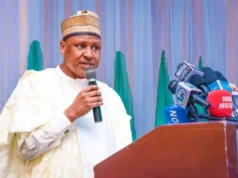Nigeria’s music industry stands tall as one of the fastest-growing cultural economies in the world, with PwC projecting revenues of over $44 million from recorded music in 2025. But beyond the numbers and global fame lies a crucial question — can this growth become truly sustainable?
For too long, the Nigerian music scene has been driven by immediacy and virality. Artists often chase quick hits that dominate TikTok or radio charts for a few weeks, only to fade into the background soon after. This “hit factory” model, while commercially rewarding, has made it difficult for the industry to build long-term artistic and cultural foundations.
In this landscape of fleeting fame, Damilola Akinwunmi — popularly known as Dapper — is charting a different course. Through Dapper Music & Entertainment, he’s building not just a label, but an ecosystem rooted in resilience, innovation, and authenticity.
“It’s never just about putting out songs,” Dapper explains. “It’s about creating systems that outlive the moment — spaces where artists can grow, experiment, and still stay true to their roots. Impact and innovation aren’t extras; they are the foundation.”
For Dapper, impact is more than a buzzword. It’s a guiding principle that reflects the realities of Nigeria’s youth — their struggles, dreams, and defiant hope. When artists like TML Vibez, Bhadboi OML, Rybeena, and Kashcoming sing about love, faith, or survival, they aren’t just creating hits; they’re telling the collective story of a generation.
This authentic storytelling has built a loyal fanbase that sees music not just as entertainment, but as community and identity. Each release becomes a mirror of society, documenting both the beauty and chaos of contemporary Nigerian life.
At Dapper Music, innovation is treated as necessity, not luxury. From fusing orchestral arrangements with street anthems to introducing cross-border collaborations like Ghana’s Lasmid, the label is expanding the language of Afropop.
Dapper’s approach challenges the industry to move beyond formula — to blend tradition with experimentation, and to rethink how African soundscapes are presented globally. This balance of heritage and modernity ensures the music remains authentically Nigerian yet universally relevant.
The true legacy of Dapper’s work lies in infrastructure and intention. By investing in artist development, creative freedom, and cross-cultural storytelling, Dapper Music & Entertainment is proving that leadership in Afropop must go beyond metrics and virality.
If Nigeria’s music industry is to transition “from moment to movement,” it must embrace impact and innovation as non-negotiable pillars. Dapper’s model offers a glimpse into that future — one where creativity is purposeful, leadership is visionary, and success is built to last.






